| SHADOWS ON THE WALL | REVIEWS | NEWS | FESTIVAL | AWARDS | Q&A | ABOUT | TALKBACK | |||||
 Shadows off the beaten path Shadows off the beaten pathIndies, foreigns, docs, revivals and shorts...
On this page:
BLOODY MARIE |
COPA 181 |
THE LONGEST NIGHT
| |||||
| See also: SHADOWS FILM FESTIVAL | Last update 6.Nov.19 | |||||
|
Bloody Marie Review by Rich Cline | 
| |||||
 dir-scr Lennert Hillege, Guido van Driel prd Floor Onrust with Susanne Wolff, Dragos Bucur, Jan Bijvoet, Alexia Lestiboudois, Mark Rietman, Teun Luijkx, Therese Affolter, Leny Breederveld, Kim Hertogs, Anna Tenta, Dennis Rudge, Murth Mossel release Ned 23.Feb.19, US 1.Nov.19 19/Netherlands 1h27 |
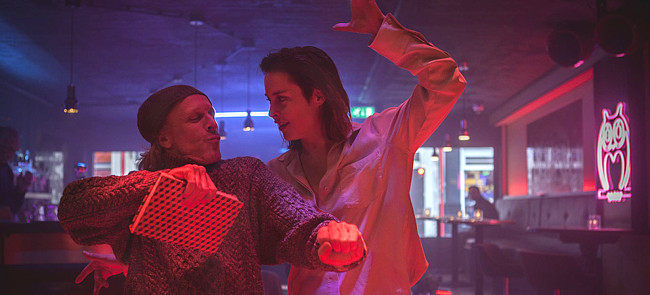 Based on a graphic novel, this Dutch drama is set in Amsterdam's red light district, which allows filmmakers Lennert Hillege and Guido van Driel to drench the imagery in enjoyably lurid colours. The narrative is somewhat meandering, centring on small moments in the life of a woman who finds herself in the midst of criminal nastiness. This clever approach allows the film to remain provocatively intimate. Living among prostitutes, comic book artist Marie (Wolff) is out of cash as she nearly pickles herself in alcohol. Haunted by dreams of her late mother (Affolter), her publisher is worried: it's been six years since her last book. She's also just sold her shoes to beefy neighbour Dragomir (Bucur) for a bottle of hooch. But a drinking buddy (Bijvoet) helps her get out of her head, and her aunt (Breederveld) keeps checking in on her. Then after she steals some cash from Dragomir, he and his aspiring artist girlfriend Iliana (Lestiboudois) come to visit. From here, Marie is dragged into an unexpected world involving gangsters, hookers and murder, although this never quite takes over the film. Hillege and van Driel take an impressionistic approach, using internalised observations and tiny details to convey deeper ideas. Scenes often resolve into one of Marie's beautiful cartoon panels, offering another type of glimpse under the surface. And when she ascends to a rooftop, wobbling ominously on the brink, her relentless curiosity gathers a Hitchcockian sense of danger that spirals in mind-boggling directions. Wolff gives Marie a remarkably textured personality. Emboldened by alcohol, she's confrontational one moment, then feels waves of moodiness the next. Even when she's falling-down drunk, she's alertly engaging with those around her. None of the other characters are as fully developed, simply because they are seen incompletely through Marie's eyes. But there's a sense of their lives off-screen as they cross her path. Marie's only solid relationship is with her dog Lieze, but Wolff finds fascinating connections in unexpected places. As Marie's experience becomes increasingly out of control, the film becomes very dark indeed, including some desperately brutal action sequences. But the focus remains on Marie's internal odyssey, profiling a woman who is forcibly awakened from the grief that has left her sleepwalking through life. It's not always clear to the viewer exactly what criminality Marie has stumbled into, but she has no idea either. So where the film goes is tricky, packed with implications and unexpected encounters. It's a haunting drama that skilfully avoids cliches.
| ||||
|
Copa 181 Review by Rich Cline | 
| |||||
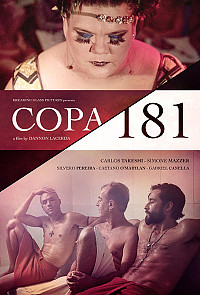 dir-scr Dannon Lacerda prd Marina Trindade with Carlos Takeshi, Simone Mazzer, Silvero Pereira, Gaetano O'Maihlan, Gabriel Canella, Fernanda Boechat, Higoe Campagnaro, Otto Jr, Paulo Giannini, Sergio Coehlo, Andre Maizena, Augusto Telles release Br Oct.17 rjiff, US 29.Oct.19 17/Brazil 1h22 |
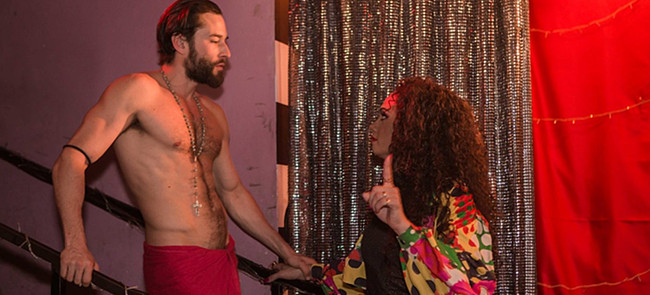 There's an earthy, honest realism to this Brazilian drama, which imaginatively explores a group of fascinating characters in Rio de Janeiro. Writer-director Lacerda tells the story in a loosely unstructured way that feels almost like a fly-on-the-wall documentary. But as it continues, the emotional connections get stronger and the people on-screen become remarkably easy to identify with. It's just that they live out their fantasies more than most people do. In Copacabana, Tana (Takeshi) owns a crowded hardware shop, while his wife Eros (Mazzer) is an opera singer. Both are regulars at Copa 181, a local sauna where Tana seeks anonymous encounters with men and Eros sings on-stage. Also performing is aspiring singer Kika (Pereira), a trans female cleaner. She knows that her fling with sauna regular Leo (O'Maihlan) is unlikely to get serious, since he has a wife and kids, has sex with men and violently insists that Kika supports him. But then, the sauna isn't actually the real world. Or is it? Both Tana and Eros have given up their homes to move to Rio: Tana from Japan and Eros from a remote village. So the sauna feels like their anchor, and Lacerda brings the viewer in using blurry slow-motion before things get rather more explicit. And the character complexities pull the audience in further, as the sauna becomes a parallel world in which each person can be who he or she really is, using sex and music. Although conflicts find them here too. Performances are warm and low-key, never overplaying the drama. This sharply balances darker intensity with more lively comical sequences, such as a raucous birthday Tana celebrates with his towel-clad buddies. The actors are likeable, interacting with a smile. The obvious exception is Leo, whom O'Maihlan nicely plays as a sulking diva with anger issues. Pereira's Kika longs for a normal life, while Takeshi and Mazzer play scenes like an old married couple, hoping they can keep loving each other in their own way. Lacerda never moralises about the fact that Leo and his friend Davi (Canella) are selling sex, or that Tana and Eros have a marriage of convenience. These are simply portrayed as what it takes to survive in the world. And their lives aren't bad at all, even if each person yearns for a deeper romantic relationship. Tana admits to Eros that he's happiest at the sauna, and she reminds him that happiness is something that's inside you wherever you are. And she's not quite there yet.
| ||||
|
The Longest Night La Mala Noche Review by Rich Cline | 
| |||||
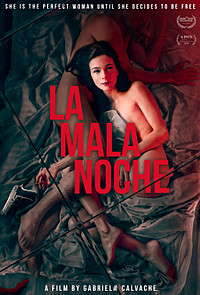 dir-scr Gabriela Calvache prd Gabriela Calvache, Geminiano Pineda with Noelle Schonwald, Cristian Mercado, Jaime Tamariz, Ariana Freire, Nadine Munoz Cervantes, Cristina Marchan, Juan Jose Franco, Joaquin Gonzalez, Diego Mignone, Gonzalo Gonzalo, Javier Ordonez A, Gonzalo Gallardo release US Mar.19 sxsw, UK Jun.19 eiff 19/Ecuador 1h35 |
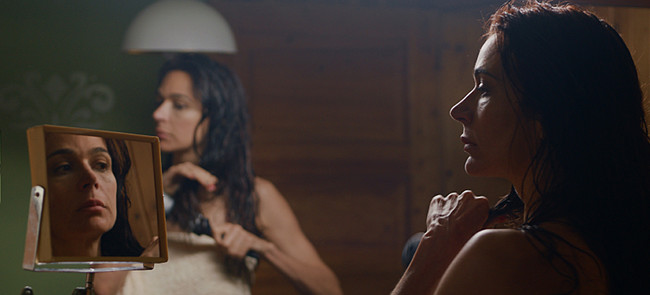 Artfully shot and edited, this moody dramatic thriller from Ecuador gets under the skin of its characters as a series of events pushes them in increasingly dangerous directions. Writer-director Gabriela Calvache keeps emotions right under the surface as the stakes grow higher for each character. And since it remains resolutely focussed on the internal journey of its protagonist, the relatively tired hooker-vs-pimp premise gains added resonance. As a coastal region recovers from a devastating earthquake, the raven-maned Dana (Schonwald) glides through the mountain capital city Quito visiting her clients, including a professor, Diego (Mignone), and a doctor, Julian (Mercado). But her heartless pimp Nelson (Tamariz) is unhappy that she wants to be more independent, so he sends a goon (Franco) to rough her up. Julian unnerves her by coming to her rescue, and he's thrown to hear she is working as a prostitute to pay for her daughter's hospital bills. But he doesn't know the half of it. The film opens in an almost dreamlike trance, as Dana strolls through a crowd of men in a misty forest. Events and images echo and swirl through the film, highlighting the starkly different opportunities available to those who have a lot, just enough or nothing at all. Dana's story is crosscut with images of tiny Lulu (Freire), found wandering on a beach by Nelson's sidekick Wendy (Cervantes) then locked in a room. And when Dana sees her in Nelson's brothel, she becomes obsessed with saving her. Schonwald gives Dana a fascinatingly inscrutable personality, just getting on with life, putting up with abuse from men, finding an antiques restorer to paint over a scar. Schonwald is unflappable in the role, adding unexpected angles to every scene, including some harrowingly awful moments. Her chemistry with Mercado is quietly intense, and he brings some surprising compassion to the role. While their relationship never becomes a trite plot point, their connection drives the narrative. Dana is disillusioned by the way men promise everything but only want women to be whores. And if she refuses, she's likely to end up dead. So her mission to get Lulu out of Nelson's clutches feels like a desperate act of redemption. Even as Calvache deploys some of the usual genre cliches, she's quietly turning the tables on a culture of machismo. The freaky climactic sequence seems set to become a riff on Taxi Driver, but this film has something even more provocative up its sleeve.
| ||||

See also: SHADOWS FILM FESTIVAL © 2019 by Rich Cline, Shadows
on the Wall
HOME | REVIEWS | NEWS | FESTIVAL | AWARDS
| Q&A | ABOUT | TALKBACK | | ||||
